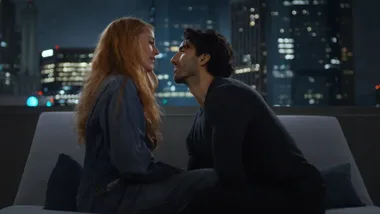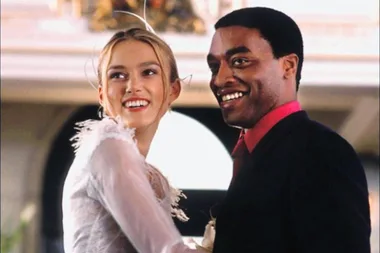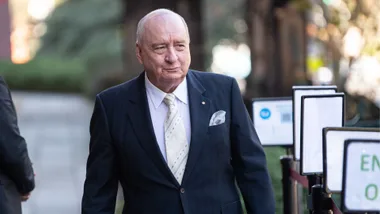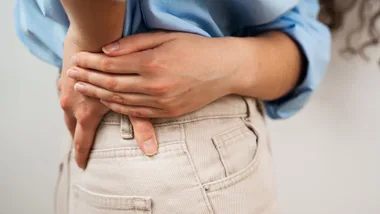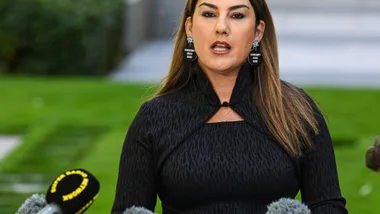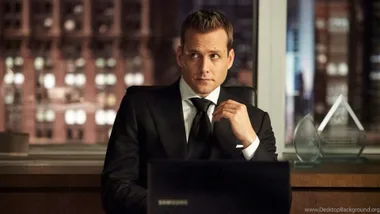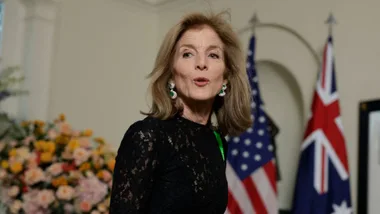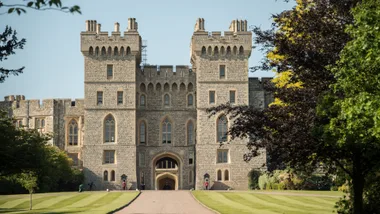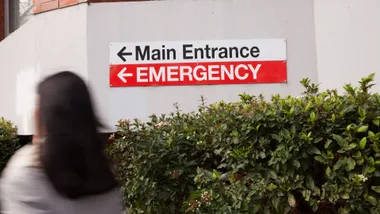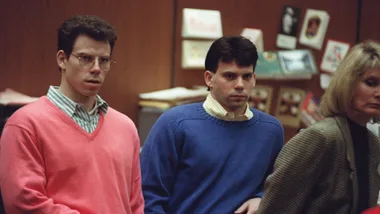Whether leading with courage, fighting for change or making us smile, these inspirational women have risen to the challenge in 2020. A round of applause for the game-changers and hope-makers.
Healthcare Workers On The Frontlines Of COVID-19
Healthcare workers are not heroes. Such is the stance of medical professionals across the globe as they fight COVID. Healthcare workers are not superhuman; they’re real people with real pain, fears and emotions, who’ve been thrust onto the frontline of a deadly pandemic. And we salute them.
It’s been months since Australia reported its first case of the novel coronavirus, which was found in Melbourne. Since then, the women pictured here—nurses at The Royal Melbourne Hospital—have worked in a pressure-cooker environment. They’ve endured gruelling hours, PPE shortages and periods of separation from loved ones, and they’ve watched patients suffer and die without family at their bedside. At the time of writing, Australia’s death toll was 905.
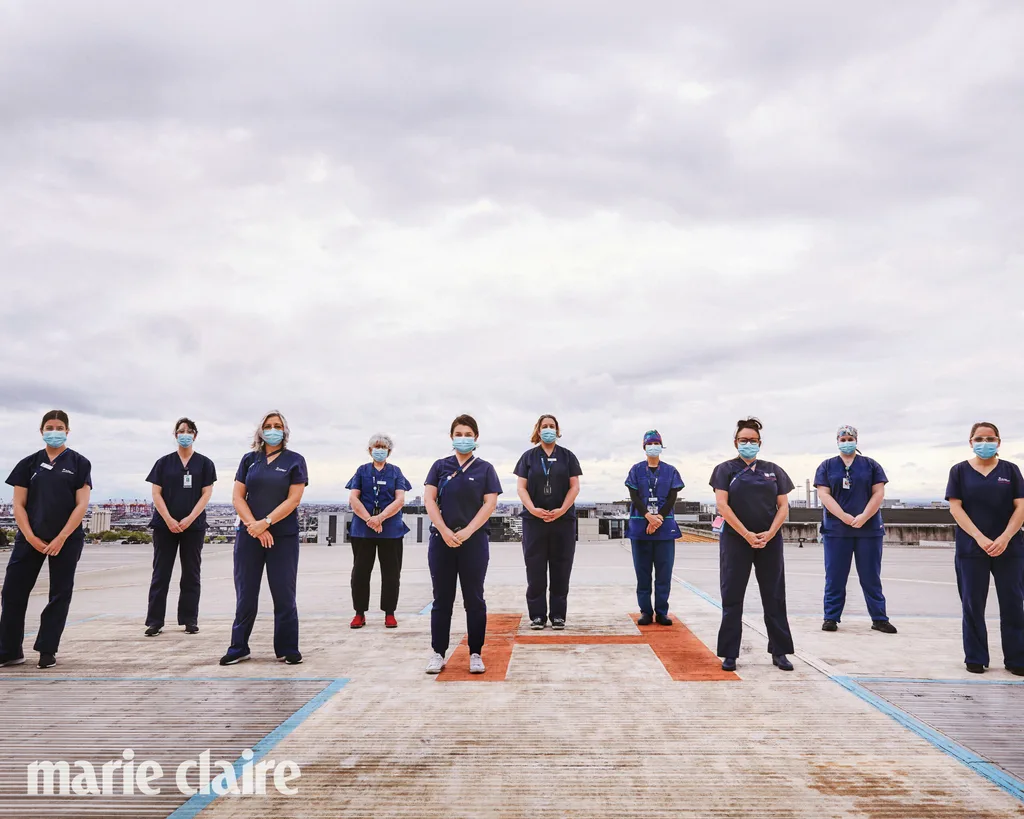
The personal health risk has also been immense. “I was one of the first few staff members who caught COVID at the start of [Victoria’s] second wave,” says Michele Wigg, a nurse in the Acute Medical Unit. “I believe I caught it from an elderly gentleman; I knew there was a risk in nursing this patient. I was not able to physically distance from him due to the type of care he required, but I had to give him the same care that I would give any other patient. He tested positive at the end of my shift and died four days later.”
Wigg, who isolated in a hotel, was just one of thousands of infected hospital workers. As of October 14, 3500 health care professionals in Victoria had reportedly tested positive for COVID. Between July 1 and August 31, RMH identified 262 positive cases among staff.
Gladys Berejiklian
For NSW Premier Gladys Berejiklian, 2020 has been defined by both political plaudits and personal anguish. She’s led her state through fire, flood and plague, and found herself entangled in a headline-grabbing corruption scandal. And it’s been her most revealing year yet.
Berejiklian can remember the moment the new year ticked over. “I was expecting to host my extended family at home, but spent the whole day at Homebush at the RFS [Rural Fire Service] headquarters… But in a strange way, the bushfires prepared me for COVID. I had the benefit of experience.”
Her pandemic response was quick, cool and calm, though intensely taxing behind the scenes. “Putting NSW into lockdown was tough,” she recalls. “At the beginning, I don’t know if any of us thought we would cope with the restrictions. Especially around Easter; I’d never spent Easter by myself before.” And yet, despite a few scares, the premier and her team have managed NSW’s outbreak thus far.
She’s one of a group of global women lauded for her leadership in 2020. “I don’t think it’s a change in how women have responded [to a crisis], it’s a change in how society is responding to female leaders,” says Berejiklian.
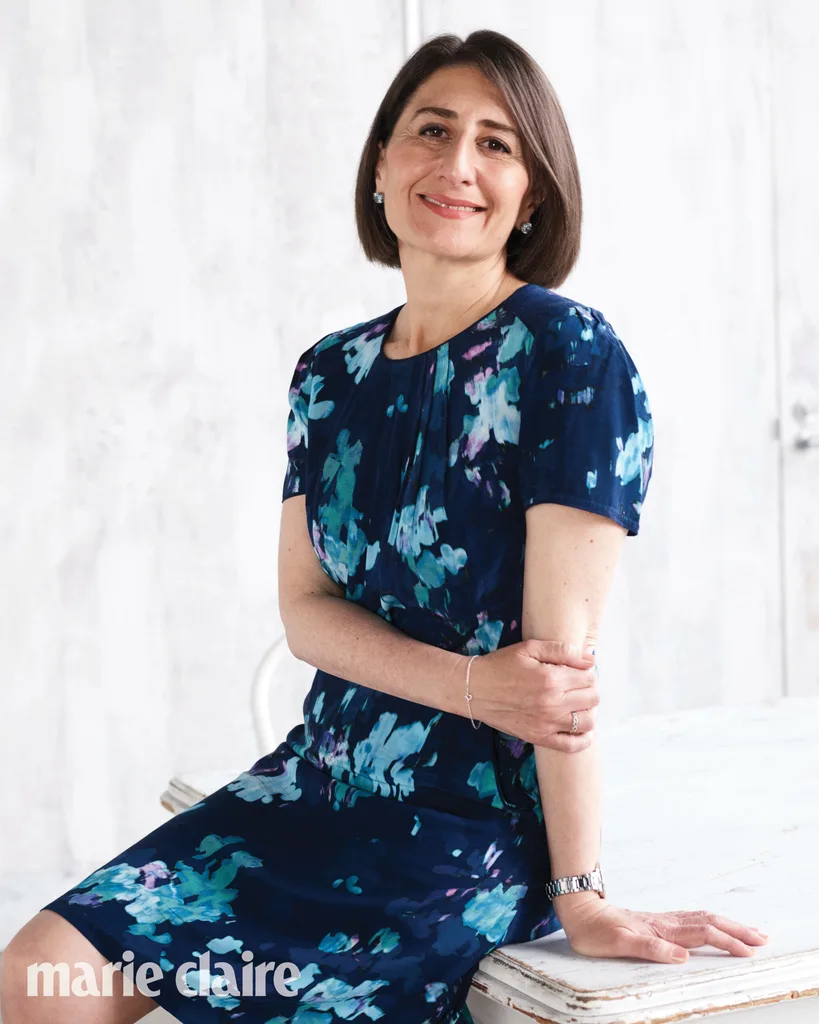
Hannah Clarke
When Hannah Clarke and her three children were killed by her estranged husband on February 19, the nation mourned. The Brisbane mum was driving Aaliyah, six, Laianah, four, and Trey, three, to school when they were ambushed by Rowan Baxter, who doused the family in petrol and set them alight.
The horrific act of domestic violence devastated Australians, while Hannah’s parents, Lloyd and Sue Clarke (pictured below), were left grappling with grief that felt insurmountable. But they have managed to find some comfort in realising the impact of their daughter’s incredible bravery.
“Though she had burns to 97 per cent of her body, Hannah still managed to give police a clear and articulate statement,” says Sue. “Afterwards, she passed out, but when she came to for a brief period, she pushed herself to repeat it. The police were in awe. It was truly to make him pay, she didn’t know he was dead. She was going to fight for her babies to the end.”
The ambulance officers who took Hannah to hospital told the Clarkes that her final heroic act had been life-changing. “Because Hannah was so brave, they told us that it had made them stronger too; it’s changed them for the better,” says Sue.
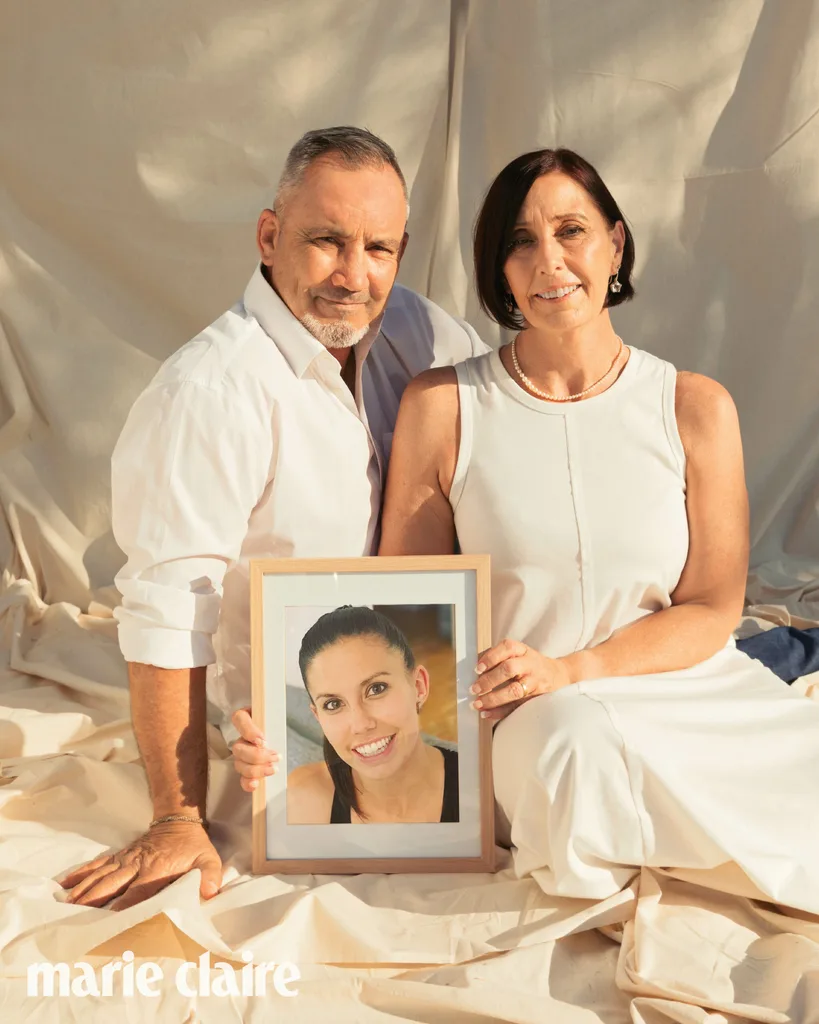
Determined to rewrite the ending of their daughter’s life, the Clarkes have established the Small Steps 4 Hannah foundation, through which they hope to raise awareness about controlling relationships and domestic violence. Ultimately, they want to see coercive control become a criminal offence in Australia. To support the campaign, sign the petition at coercivecontrol.com.au.
“Hannah’s story has already changed so many lives—people who didn’t understand what coercive control was have realised they are actually in an abusive relationship. Hannah didn’t realise it for a long time either, she’d say to us ‘But he’s never hit me’,” explains Lloyd. “We just wanted to do anything we could to prevent other people from going through the pain we’ve been through.”
It’s a legacy that will reflect the caring spirit of the devoted mum, whose smile “lit up the room”. Says Sue: “That was our girl; she always wanted to help others, so we want to do it in her name. There has to be some good to come from this.”
For help with issues of domestic violence call 1800RESPECT on 1800 737 732.
Virginia Roberts Giuffre
Virginia Roberts Giuffre will never forget 2020. It will forever mark the year that Ghislaine Maxwell was arrested for her alleged involvement in convicted sex offender Jeffrey Epstein’s rampant abuse of young women and girls. It was Maxwell, Giuffre says, who lured girls into the US billionaire’s world—and she was one of them.
The former British socialite’s arrest on July 2 was intensely emotional for Giuffre, who has accused Maxwell and Epstein of forcing her to have sex with a cohort of their powerful friends, including Prince Andrew, when she was just 17.
“In the months after Epstein died last year, I kept waiting to hear that Ghislaine had been taken into custody, denied bail and locked away for her heinous crimes against children,” Giuffre tells marie claire from her home in Cairns. “When it happened, you can’t imagine the tears of joy pouring down my face. That was the best day of my year.”
Brave doesn’t adequately describe the mother of three, whose tireless fight against sex trafficking and child sex abuse is finally starting to have an impact, almost a decade after she decided to go public. “At times it has been truly frightening speaking up—particularly as a wife and mother concerned about her family,” admits Giuffre. “I’ve had death threats. I know the people I’m speaking out against have limitless power and money—Epstein and Maxwell wielded immense power and often let me know that they would never go to jail. But if I had stayed silent, they would still be running one of the most prolific sex trafficking rings of modern times.”
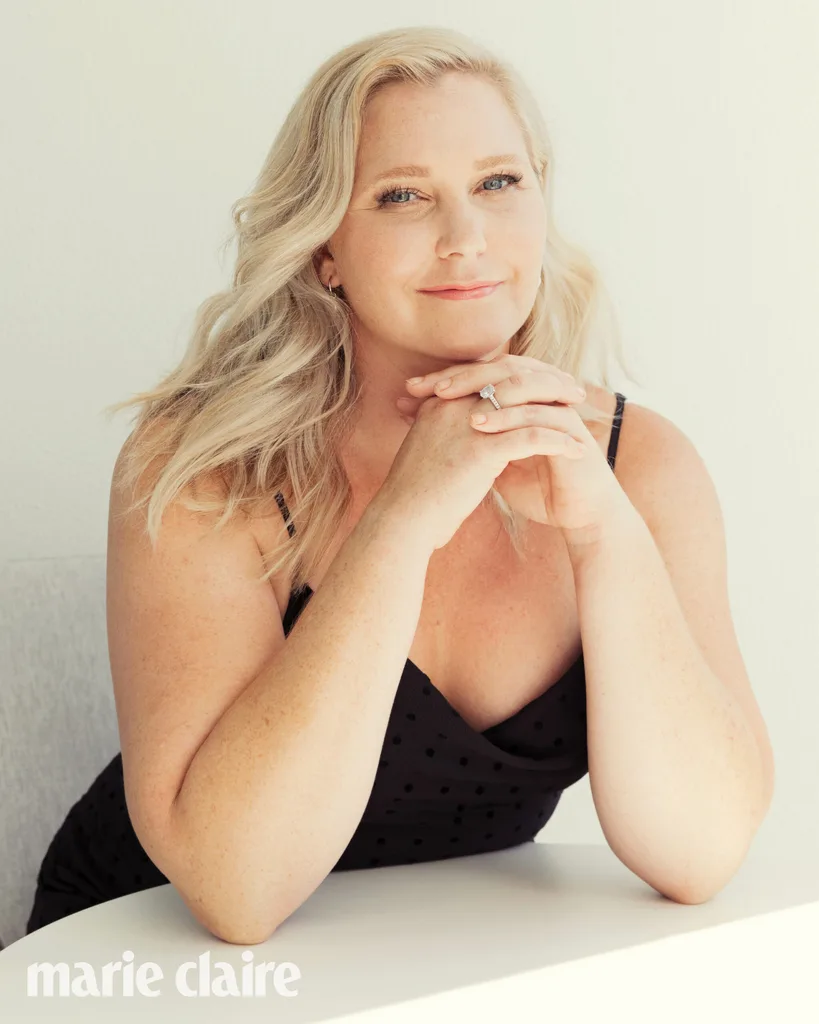
Yet Giuffre is adamant she will never be censored, as evidenced by her courageous recollections in this year’s Netflix documentary Filthy Rich. She has also established a non-profit organisation, Victims Refuse Silence, to advocate for victims of sexual trafficking and abuse. “This doesn’t end with Epstein’s death and Maxwell’s incarceration,” she insists. “The fight is far from over, and we must continue to speak out for the voiceless. I want all survivors to know that it is not their shame to carry any longer, and it never was.”
She remains confident that justice will continue to be served to all her abusers. “I believe the truth has a way of coming to light, exposing the ugly realities of what happened. It’s just a matter of time, and time is on my side.”
Celeste Barber
Ask Celeste Barber to sum up 2020, and the comedian responds in her signature unapologetic style: “What. The. Actual.”
In a year where bushfires raged and a pandemic prevailed, the Instagram icon became a fundraising phenomenon when she managed to generate an incredible $51.3 million for bushfire relief. At a time when good-news stories were few and far between, the impact of Barber’s global influence left Aussies feeling proud as punch that she was one of us.
As blazes bore down on the NSW town of Eden, where her mother-in-law lives, Barber felt compelled to call for action. She initially set out to raise $30,000 but made history when her fundraiser became the largest charity drive in Facebook’s history.
“It was so hard to watch my family so scared and so helpless, so I just did what I could and asked people for money,” she explains. “I can’t believe how much people donated—it was, and it still is, overwhelming. I mean, I’ve still got some crappy merchandise that I have been trying to sell for the past five years sitting in my garage because no-one wants to buy it. No-one was more shocked than me.”
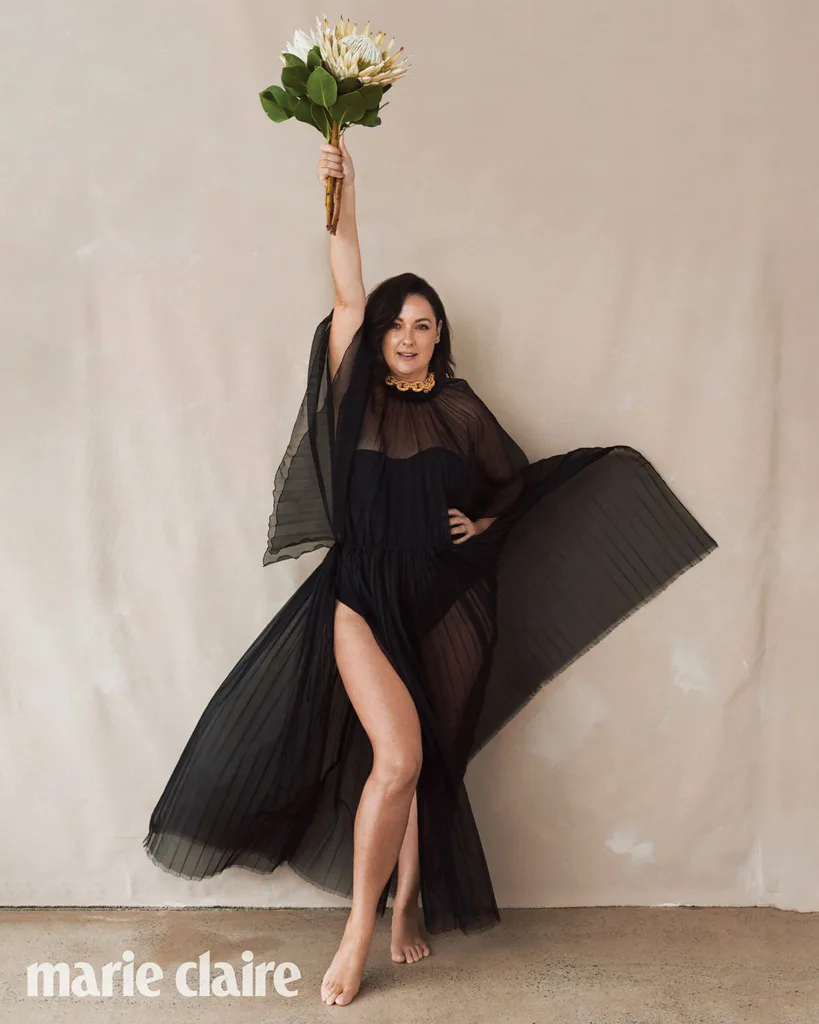
Still, she didn’t stop there. After joining forces with Chris and Liam Hemsworth to front the Make It Rain fundraiser in Byron Bay, Barber hosted the Fire Fight concert in February, raising more than $10.7 million for bushfire-affected communities.
Just don’t call her a social activist: the princess of parody has no plans to cull her comedic chops, especially during a period when the world is longing for laughs more than ever.
“I have been getting a lot of messages from people saying that all they want to do at the moment is laugh because if they don’t, the gravity of what’s going on in the world is too much,” says Barber, who lists wine and her sons, Lou and Buddy, as her coping mechanisms. “We have to laugh; it’s so important. If you can’t find anything that makes you laugh at the moment, laugh at yourself. It helps, trust me.”
Apryl Day
When Apryl Day looks at her two daughters—Kirrawai, seven, and Willarrah, four—she sees her mum Tanya Day’s fierce spirit, sassy attitude and radiating light. The constant reminder of Apryl’s mother, who died in police custody in 2017, is at once joyous and gut-wrenching.
“We have lost someone so dear to us, and that void will never be filled,” says Apryl, 28. She has fought tirelessly alongside her family for justice, working with Pay the Rent and Warriors of the Aboriginal Resistance, as well as speaking at rallies about Australia’s shameful record of deaths in custody. “We’ve had more than 400 Aboriginal [and Torres Strait Islander] deaths in custody [since the 1991 Royal Commission] and have had zero convictions,” says Apryl. “The justice and policing systems are entrenched with systemic racism. We are the most incarcerated people in the world, and we are experiencing extreme violence in this country at the hands of police. It’s imperative those injustices are acknowledged.”
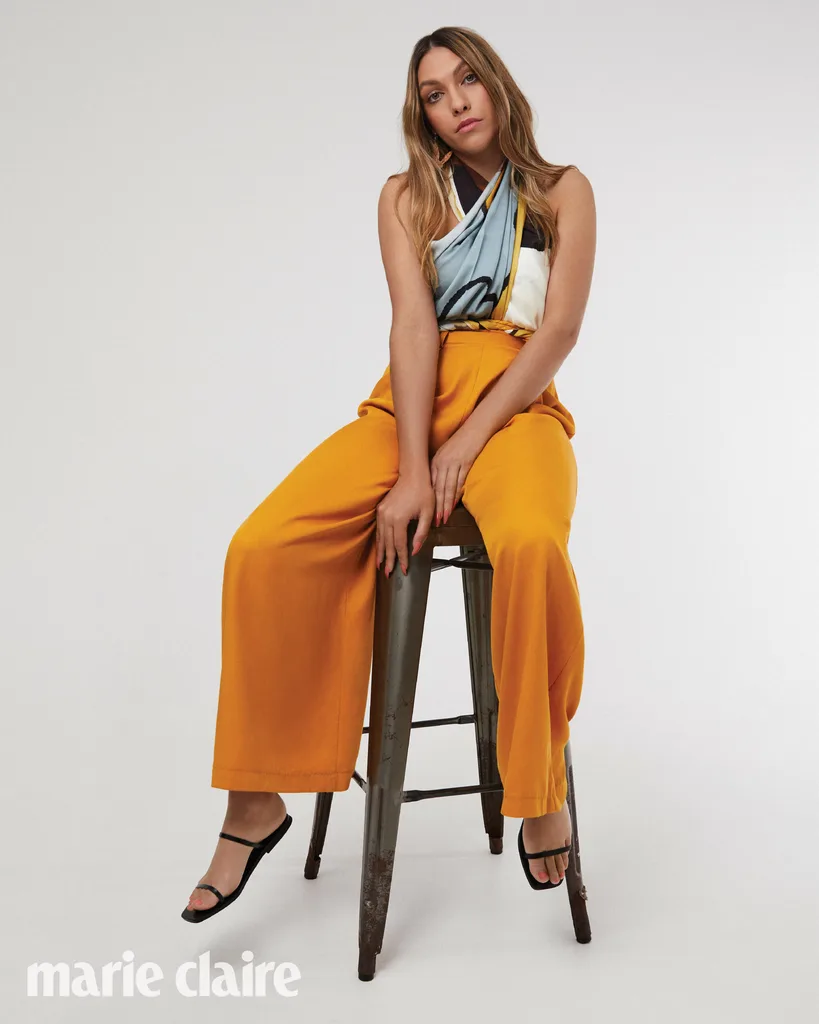
As the rally cry goes: No justice, no peace, no racist police. In August this year, after campaigning for the police involved in Tanya’s death to be held accountable, the Victorian Director of Public Prosecutions decided not to prosecute the two officers, despite the coroner calling for a criminal investigation. “It was really devastating because we have given so much to this fight, and knowing that Mum was denied justice is extremely hard for us as a family,” says Apryl, who has found strength in her family and community.
This month, Apryl will launch a grassroots charity, the Dhadjowa Foundation, alongside other people who’ve had family members die in custody. “Dhadjowa means ‘sunshine’ in Yorta Yorta; it’s a nod to Mum’s spirit and how she would light up a room. It’s also about shining a light on the injustices Aboriginal people are facing, and a blazing reminder to the government that we will continue to fight for justice,” says Apryl, with dogged determination. “My hope is that we have no Aboriginal deaths in custody, that our people are able to live without risk of dying because of the colour of their skin, and that those who are responsible for taking Aboriginal life are held criminally responsible, and justice is served.”
Adut Akech Bior
Backing up 2019 was always going to be difficult for Adut Akech Bior. The 20-year-old closed out the decade with a slew of accolades to her name: the British Fashion Awards’ Model of the Year, a coveted spot on the Time 100 Next list, and a personal shout-out from Meghan Markle as a “force for change”.
So what did the top model do next? She continued to dominate the fashion landscape, and in doing so, stayed true to Markle’s words.
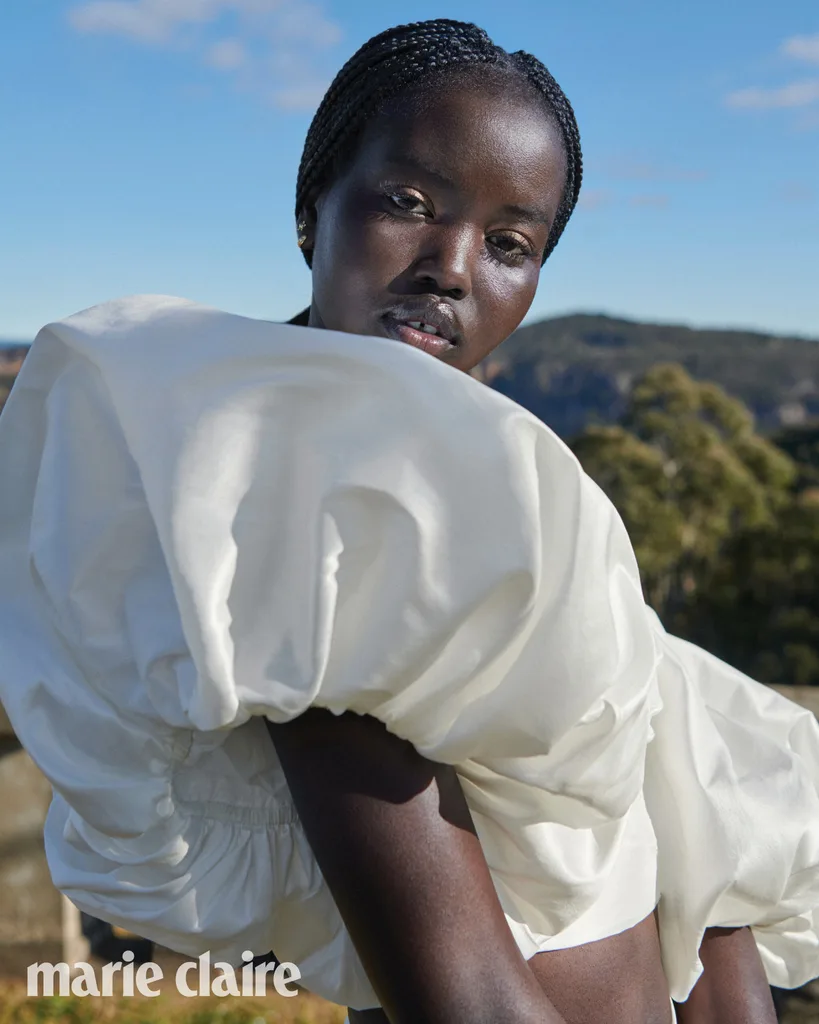
While coronavirus lockdowns and travel bans sent the fashion industry into a spin, Akech kept working: in July, she was one of just two models Chanel’s creative director, Virginie Viard, chose for the label’s digital couture show; and in September, she walked for Versace, Fendi, Boss and more at Milan Fashion Week.
Meanwhile, she became a face of Tiffany & Co.’s Tiffany T1 collection, and stars in David Jones’ dreamy new-season campaign (pictured below).
Akech is outspoken on issues of diversity and discrimination. Born in what is now South Sudan and raised in a refugee camp in Kenya, Akech moved to Adelaide at the age of eight. Last year, when a magazine misidentified her as a different Black model, she called out the “unacceptable” racism. This year, as the Black Lives Matter movement gripped the world, her Instagram plea to “do better” seemed more pertinent than ever.
“I used to be silent,” she told her mentor and “fashion mama” Naomi Campbell in an interview in April. “But my voice is my [gift] that nobody can ever take away from me. And I’m going to use it.”
Sarah Snook
“People would do well to remember there’s going to be a new sheriff in town,” says Succession’s Siobhan ‘Shiv’ Roy, played by Australian actor Sarah Snook. Spoiler alert: she’s gunning for the position. Roy, the only daughter of a media mogul, is hard-arsed, self-assured and cutthroat: all fitting qualities of someone whose nickname describes a blunt object sharpened into a potentially lethal weapon. In the brutal and heavily male-dominated knife fight that is the smash-hit series Succession, Shiv is a fan favourite—all thanks to Snook’s masterful performance. “She is a bit of a boss-lady,” Snook has said. “Although, I feel like that’s maybe undercutting it. You shouldn’t have to add ‘lady’ to the word ‘boss’, you know? She’s just a bit of a boss.”
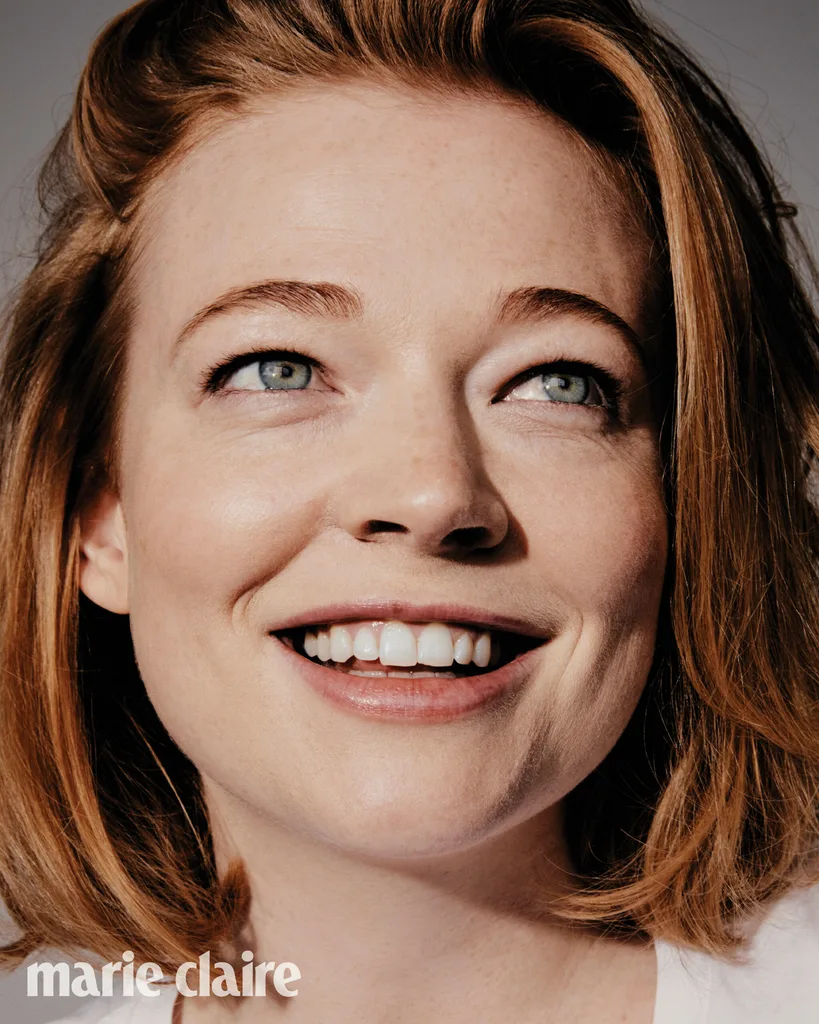
This year, the Adelaide-born actor was nominated for an Emmy and Critic’s Choice Award for her standout role in the “worldwide phenomenon”. Not bad for an actor who only got into the National Institute of Dramatic Art (NIDA) after another student dropped out.
Having starred in the Jocelyn Moorhouse drama The Dressmaker in 2015 and appearing alongside Dame Helen Mirren in 2018’s Winchester, 2020 has been the year for Snook, catapulting her to international stardom and industry acclaim. She took a character who could have easily been the token pretty-faced woman in the room, and made her a staunch power player. “In reality, there’s still inequality in business at that level. It’s a lot of white men, but Shiv had a chance to kind of crowbar that open,” says Snook, a real-life “humanist” who has long fought for gender equality. With Snook wearing the sheriff’s badge on-screen and off, we’re in safe (and slightly savage) hands.
Chloë McCardel
“It is a liberating experience because everything is out of your control,” says Chloë McCardel of swimming the English Channel. In August, the Melbourne-born, Sydney-based long-distance swimmer completed her 35th crossing (her fourth in 16 days) after 10 hours and 40 minutes of icy water. She battled the weather and the waves as she steered clear of the 400-metre cargo ships travelling between England and France. “It was a relief to get it finished. I was exhausted,” she tells marie claire. “But when I got back on the boat, my exhaustion turned to euphoria.”
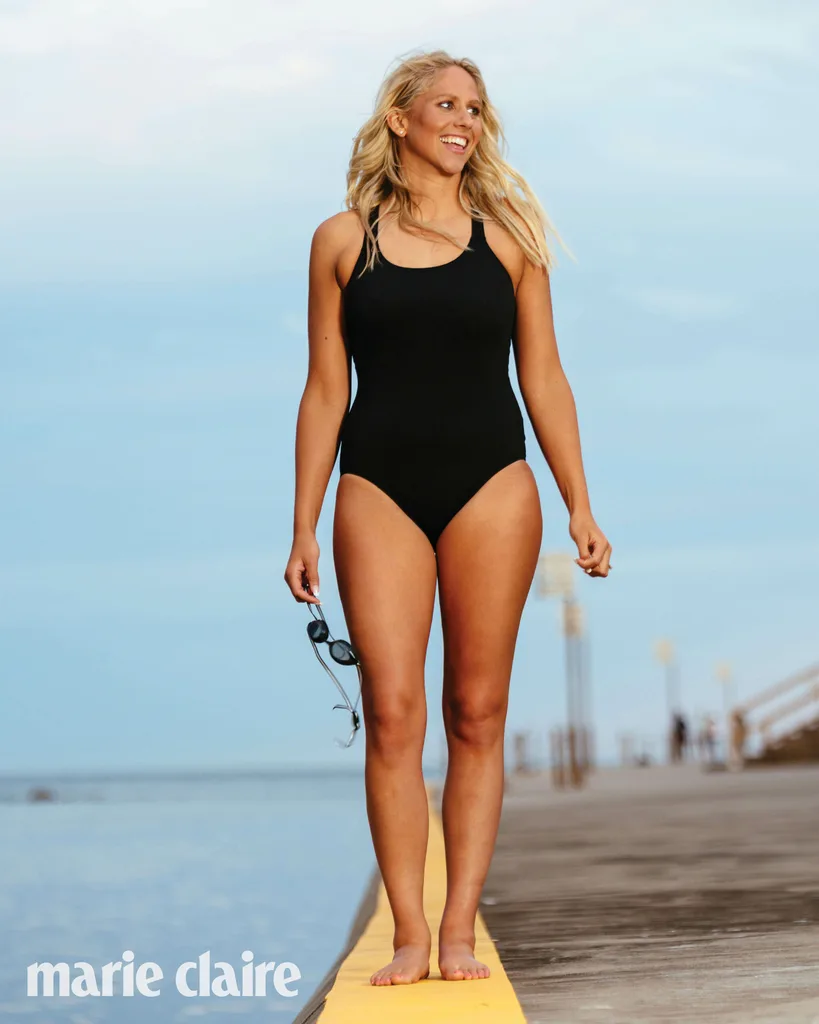
Finishing this journey—after 16 years of endurance swimming—was especially sweet for McCardel because she overtook the men’s world record of 34 swims. The phenomenal feat garnered international media attention, which McCardel used to shine a light on an issue that’s touched her life: domestic violence. “Having experienced domestic violence [in a past relationship], I’ve been diagnosed with post-traumatic stress disorder. It took me a long time to realise I shouldn’t be ashamed. There’s nothing wrong with me, there’s something wrong with the victim-blaming and negative perceptions surrounding domestic violence and mental health,” explains McCardel, 35, speaking from London where she’s hoping to do another two Channel swims before returning to Australia. “I wanted to be a part of the positive change and to open up the conversation about these issues.”
By smashing world records and sharing her story, McCardel is also hoping to break down the stigma associated with domestic violence. Next year, she’s gunning for the title of most English Channel swims ever, which is currently held by Alison Streeter, who has swum the 35-kilometre distance 43 times. “[Endurance swimming] is a reminder of how incredible the human spirit and human body are,” says McCardel, like the survivor she is.
This article originally appeared in the December issue of marie claire Australia.
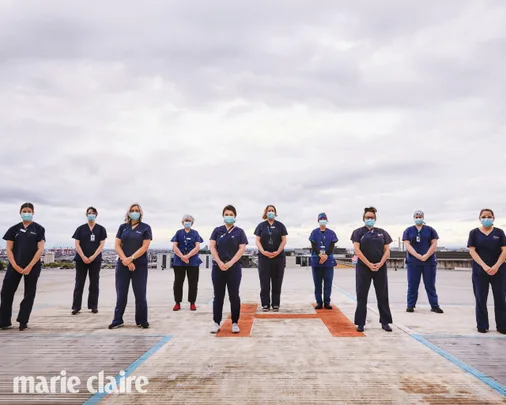 Photography: Ren Pidgeon. Special thanks to the Royal Melbourne Hospital.
Photography: Ren Pidgeon. Special thanks to the Royal Melbourne Hospital.
